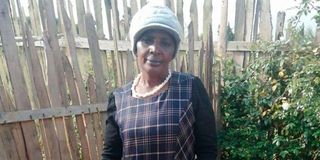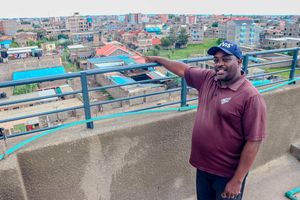
Catherine Murigi (left) and Eunice Wangui.
In the story ‘The Monk Who Scammed a Family’, which occurred in India last year, a mother’s long-lost son returned as a spiritual leader after 22 years - only to scam his purported family out of 11,000 rupees through identity theft.
Bhanumati Singh, from Delhi, was overjoyed when she was reunited with her ‘son’ Pinku, who had disappeared in 2002 at the age of 11. The family had been informed that an ascetic visiting their native village of Kharauli bore the same scar as Pinku. Convinced by relatives, Bhanumati and her husband, Ratipal Singh, travelled to meet him - and the ascetic claimed to be their lost son.
Following the reunion, a video showed the ascetic seeking alms while singing folk songs, with an emotional Bhanumati embracing him. He later told the family he wanted to return home but claimed he couldn’t leave the monastery unless he paid them a sum of money. Desperate to have him back, Ratipal sold his land for Rs 11.2 lakh (equivalent to about Sh1.6 million).
However, growing suspicious, the family involved the police, who discovered that the man was actually Nafees from Gonda village, attempting to scam them. NDTV India reported the incident on February 10.
The con story of Pinku and Bhanumati may seem distant, but back home, thousands of Kenyans working abroad continue to lose millions of shillings. For many, this happens after years of hard labour abroad — only to be milked dry by family members entrusted to invest on their behalf.
They often return home shocked, broke, and vulnerable.
Eunice Wangui, from Kiambu, had big dreams when she moved to Saudi Arabia in 2019 to work as a house help. Having left behind debts and poverty, she hoped to finally own a home after renting for eight years. After three years of saving, she shared her dream with her brother, who told her about a prime residential plot near Soko Mjinga along the Nairobi–Nakuru highway in Kiambu County.

Eunice Wangui who worked as a househelp in Saudi Arabia. She lost money to her brother.
Excited, Ms Wangui wired nearly Sh600,000 to her brother. The land was successfully purchased and transferred to her name, giving her confidence in his trustworthiness. She later sent an additional Sh800,000 for the construction of a three-bedroom house - only to return in 2022 to find an empty shell.
“I’ve never recovered mentally after working hard abroad, only to be reduced to nothing by a close family member I trusted to invest on my behalf. As we speak, I have no job and I’m trying to pick up the pieces while raising my two children,” Ms Wangui, 47, told the Nation.
Yet, as devastating as losing nearly Sh800,000 was, what awaited her back home was even more harrowing. She had flown back to bury her son, who had died on May 17, 2022. His burial had been delayed by four months as Ms Wangui struggled to secure leave from her employer. Denied permission, she ultimately opted for deportation.
Gulf countries continue to enforce the oppressive kafala system, which governs unskilled migrant workers — most of them women from Africa and Asia. The system requires each worker to be sponsored by a citizen of the host country. The employer, or kafeel, controls the worker’s legal status and visa. When a contract expires, the employer decides whether to renew it or terminate the worker’s status — leading to immediate deportation.
Essentially, kafala creates an extreme power imbalance, leaving migrant workers unable to take emergency leave or report abuse without risking deportation.
Ms Wangui describes kafala as a widespread, exploitative system that continues to oppress women, with few daring to speak out. Returning home to find she’d been defrauded by her own family only compounded her pain.
“Sometimes, family ties and cultural beliefs make it difficult to take legal action against a relative. I’ve given up on recovering the money because my brother keeps promising to refund me but never does. I’m struggling to find a job, feed my family, and deal with the stress of losing my son and being conned by my own kin. Maybe if I’d been in Kenya, I would’ve noticed my son’s depression and intervened... perhaps he wouldn’t have taken his own life,” she said.
Recovering the stolen funds
Her story mirrors that of Catherine Murigi, who left Kenya for Saudi Arabia in 2014 and returned in 2019. Ms Murigi worked in a bakery and dreamt of starting her own business. To avoid impulse spending, the 33-year-old entrusted her savings of Sh710,000 to her sister for safekeeping. But when she returned home, she was devastated to learn that her sister — her confidante — had squandered the entire sum.
“Fortunately, I had small separate savings, which helped me start Leo Delicacies, a bakery specialising in cakes. We operate from Umoja, Nairobi. I also run a retail shop to supplement my income as I try to rebuild my life,” Ms Murigi told the Nation, adding that she has no hope of recovering the stolen funds.

Catherine Murigi returned from Saudi Arabia to find her savings squandered.
Mary Waithira (not her real name) moved to the United States in 2015 on a tourist visa and has yet to regularise her status — meaning she cannot travel back for fear of deportation.
In 2020, she saw a popular Kenyan YouTuber based in the US advertising a three-bedroom housing project on Kenyatta Road in Kiambu County. Convinced by the marketing, she wired Sh4.5 million to her sister to purchase the house on her behalf, expecting that the property would later be transferred to her name.
But the YouTuber had not conducted due diligence. Worse, her sister only remitted Sh1.4 million to the developer — and pocketed the rest. The company behind the project is now insolvent.
“I trusted my sister because she was on the ground. I later learned she took advantage of me—and now I’ve lost everything,” Ms Waithira told the Nation.
Is there any platform to offer support to such vulnerable returnees?
Sophia Amina, 38, has worked in Qatar, Saudi Arabia, Bahrain, and the UAE since 2012. She returned to Kenya in 2021. She describes working in those countries as a mixture of fortune and misfortune — depending on the employer.
“I can’t generalise and say all Arab countries are bad... it depends on the employer you land. I’ve seen people sign contracts in Kenya, only to be forced to accept different terms on arrival, ending up overworked and mistreated. Modern slavery is very real in these countries,” says Ms Amina.
Her experience inspired her to co-found the Domestic Workers Returnees of Kenya, an NGO incubated by the Centre for Domestic Training and Development in Nairobi. The organisation offers financial literacy and legal services to distressed migrants and returnees — especially those defrauded by relatives.






